| |
Articles |
|
| Christine Skelmersdale
regularly write
articles exploring the world of bulbs and plants. Please note that these articles are copyright ©2011 Christine Skelmersdale.
Chistine's lavishly illustrated book "A
Gardener's Guide to Bulbs" based on her 40 years'
experience of growing and selling bulbs will be published by Crowood in
July 2012. Please contact us if you would be interested in obtaining a
copy.
|
| |
| Home
Page |
|
Agapanthus:
"You
can forget the big, blousy belles of Madeira or the lusty beauties of New
Zealand and Tresco, my choice of agapanthus lies with the subtle charms of
the A.campanulatus cultivars & hybrids.
Agapanthus have been a feature of my life ever since I was taken to
Headbourne Manor as a newly engaged fiancée and left clutching seed of
their famous hardy hybrids. These had originated from a packet of mixed
agapanthus seed from Kirstenbosch Gardens sent to Luly Palmer in the
1940s."
|
 |
Lilies:
"A recent questionnaire among Garden Centre visitors revealed that
lilies are now the most popular plant. This is certainly bourne out by
our experience as they are one of our most popular lines."
|
 |
Snowdrops:
"Snowdrops are easily grown in any reasonable soil in part shade. Avoid
adding manure or compost as they do not like a soil that is too rich. G. nivalis,
the common snowdrop will naturalise in grass. The taller varieties such as G. 'Atkinsii'
and G. 'S. Arnott' look very good as small clumps under shrubs."
|
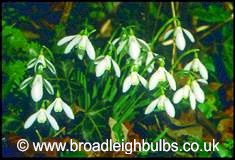 |
Blue
Bulbs:
"The prima donnas of the spring garden may be the vibrant and
showy daffodils and tulips but as with all well stage-managed productions
it is the smaller, bit parts that complete the show. Often overlooked,
these small, blue flowered bulbs are the perfect foil for the brighter
colours of other spring bulbs, especially the golden yellow of daffodils. |
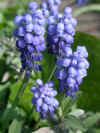 |
Crocus laevigatus 'Fontenayi':
"The
contrast couldn't be greater. After the violent gales of
the last two
weeks, today sees a welcome return to our more normal early
December weather for here in the South West.
I was frantically trying to catch up with the last of my bulb
planting accompanied by the exuberant song of a robin, presumably urging
me to even greater efforts to find his lunch, when I noticed that the
leaves of Crocus laevigatus 'Fontenayi' were well through, which is always
an encouraging sign."
|
 |
Fritillarias – a very
personal account
Although
I have been in professional horticulture for 30 years, prior to our purchase
of BG my experience of growing bulbs was limited to the few ‘normal’ daffs
that every garden has. BG introduced me to the magical world of small bulbs-
narcissus in particular, and our first RHS spring show introduced us to
Michael Upward who quickly parted us from our profit for that show,
converting it into life membership of the AGS. From that beginning our
knowledge of small bulbs expanded rapidly indeed. |
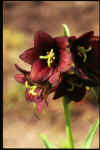 |
The
genus Iris
Whether its a haze of flag iris shimmering in the heat of
Monet's garden or rimming his waterlily pool, a bowl of stylosa on a winter
windowsill or a bunch of Dutch Iris in a florist's bucket the word iris
conjures a host of different images. Not only do they flower for more than 6
months, from Nov-June, each has very different cultural requirements.
Dwarf
Bearded Iris
Iris
germanica, the common
flag or bearded iris, with its fat, surface creeping rhizomes and broad fans
of deciduous leaves has been in cultivation for many centuries and has
spread all around the word from its Iberian home. I have seen purple flag
iris flowering in old oil drums outside a stone house high in
Tibet
and in gardens on the
island
of
Chiloe
off the coast of
Southern Chile
. There can hardly be a garden in
UK
without at least one representative of this group, whether it is the classic
old purple flag or one of the spectacular modern hybrids with their amazing
colour combinations....(This
was published in The Garden June 2009)
Winter
iris 
Brisk walks, warm fires
and plant catalogues sum up winter, a time of bare branches rather than
brightly coloured flowers but there is one group of plants that defy the
elements to produce their jewel-like flowers in this most inclement time.
These are the surprisingly sturdy winter flowering iris.....(A version of this article was published in Feb 2011 Gardens Illustrated
Magazine)
|


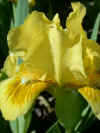
|
Jonquils in the Garden
Scent
must be the first thing to spring to mind when the name jonquil is
mentioned. The well known late flowering Narcissus jonquilla,
with up to 4 small bright golden yellow flowers is
understandably a garden favourite. Jonquil hybrids also have a long
history. The cross between Narcissus jonquilla
and Narcissus pseudonarcissus - Narcissus odorus has been in cultivation for
at least 300 years.
|
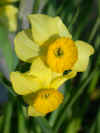 |
Naturalising
bulbs:
"One of the most powerful images of spring is the sight of
thousands of daffodils gently billowing under cherry trees. This concept
is immediately appealing, and as there are many bulbs that are
suitable for naturalising it is, with a little planning,
one of the easiest to
achieve, albeit on a limited scale."
|
 |
Shady
Characters:
"How
often do you hear the cry – nothing will grow under my tree, it’s too dry,
too shady. With the proviso that the trees or shrubs in question are deciduous
nothing could be further from the truth. It is true that in full growth the
foliage will act as a very effective umbrella, considerably reducing both light
and rainfall, but we tend to forget
that for 6 months of the year those leaves are absent. During those months – October to April - your Cinderella really can have a ball."
|
 |
Tulip
Purissima:
"Serendipity
must happen more often in the word of gardening than anywhere else, and
like all the best discoveries
this one also happened by chance. When I first planted our new garden it was natural to add a collection of bulbs to the
fledgling herbaceous border. Tulipa
fosterians 'Purissima' or 'White Emperor' as it was known then, was the
only possibility. " |
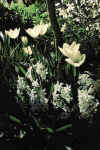 |
Using
smaller daffodils in the garden
Having spent the last 26 years
running Broadleigh Gardens, a name virtually synonymous with smaller daffodils,
I am still amazed, a few honourable exceptions apart, how neglected they are as
garden plants, particularly by alpine gardeners who seem to concentrate on the
species and neglect the smaller hybrids. |
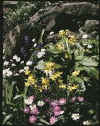 |
| |
 Broadleigh
Broadleigh













